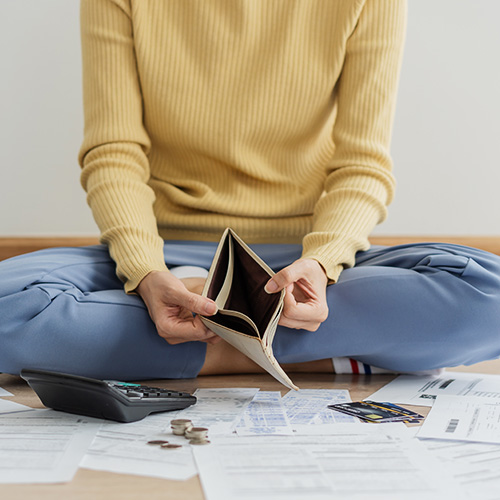Research reveals why it's so hard for young people to buy a house
Over half of the young adults we recently surveyed don't own their own home and more than 40% have less than £1,000 in savings.
We spoke to 2,000 18-40 year olds to find out what's stopping them from building up a deposit to buy a first home.
Why aren’t young adults building their savings?
It’s not for lack of trying. The young people we surveyed are putting aside nearly a fifth of their monthly income on average, with 77% saying they’re at least making efforts to save when they can.
The main culprit stopping young people from growing their savings seems to be the current cost-of-living crisis, with many mentioning food and energy costs going up as some of the main reasons why they’re struggling to put money away.
When it comes to buying a house, things get even harder — a third of respondents agree that house prices are far too high, with even more mentioning that their salary hasn’t kept up with inflation.
One of our customers, Michelle, had been putting away £100 every month from her salary so she could buy a home for herself and her son. “I’ve had to reduce it to £25 a month,” she says. “Because my food costs have gone up from £50 each week to £150”.
Michelle’s sentiment is echoed by almost half of 18-40 year olds we spoke to, who say that they’ve had to reduce their monthly savings and wish they could save more. And that’s not to mention the 20% that aren’t able to save at all, having no money left at the end of the month.
Could financial education make a difference?
Better financial education could be a great help in getting young people on the property ladder.
Only 10% of participants hold a lifetime ISA, but 77% of respondents (and 84% of those renting from a private landlord) said they would consider opening one once the product was explained to them.
Lifetime ISAs are tax-free savings or investment accounts designed for first-time buyers. There’s a 25% government bonus on everything you invest up to £4,000 per tax year, meaning you could be getting an extra £1,000 per tax year to put towards your home deposit. If you use the money before the age of 60 for anything other than buying a first home, you get charged a government withdrawal fee.
The fact that young people aren’t fully aware of the tools available to them isn’t surprising. In fact, only 13% of people surveyed learned about money at school, with almost half saying they wish they’d been taught more about it when they were younger.
Matthew Ellis, Sales and Marketing Director at OneFamily, agrees that times are tough for young adults and that financial education could be a big help.
“It’s no wonder that the majority of this generation of young adults don’t own their own home,” says Ellis. “When an increasing number of families are having to live payday to payday. Salaries are lagging behind the rises in the cost-of-living, and with rent to pay, putting aside money for a deposit may seem impossible.
“So, it’s important that people know about financial products like lifetime ISAs that could help them get more from their savings. If young people had the chance to learn about personal finances earlier in life, it may help them have more options to save for the future.”
How you could start building up your savings
To help get young people started, Matthew also gives some of his best tips on saving for a first house.
1. Set goals and make a plan
“Buying a house is likely the biggest investment you will ever save for, so breaking it down into achievable steps can make getting on the property ladder more manageable. Using a mortgage deposit calculator to work out how much you can borrow and how long it will take to save for a deposit will help you set a plan you can stick to.”
2. Cut down on monthly expenses
“Create a budget spreadsheet with your monthly outgoings so that you can see all your spending in one place. Have a serious think about which payments you can reduce - whether it’s switching to a cheaper phone contract or stopping that magazine subscription you had forgotten about - it all adds up!”
3. Pay off your debts
“Having debt can affect the mortgage and interest rate you’re able to get. So, paying off any credit cards, car finance, and personal loans sooner rather than later will avoid a nasty shock down the line.”
4. Save before you spend
“Putting your planned savings away as soon as possible is the best way to avoid temptation when payday comes around. Saving as soon as you get paid is a good way to help stick to your budget.”
5. Set up a regular payment
“Keeping on top of bills and spending can be a challenge, so setting up a weekly or monthly regular payment into your savings account is the easiest way to ensure your money is building up without even having to think about it.”
If you or someone you know is struggling to save for their first home, our first-time buyers page has all kinds of information on what you’ll need and how to get there.
If you’re just looking to build up your savings, there’s a lot more content on our Savings hub to help get you started.

OneFamily Lifetime ISA
If you want to save for your first home or for life after 60, our Lifetime ISA could help. You'll gain a 25% boost from the government on top of your savings, as well as any potential stocks and shares returns.
Our Lifetime ISA invests in stocks and shares. This means it has good long-term growth potential, but the value of your investments could go down as well as up so you could end up with less money than you've put in.

More ways to build your savings
You may also be interested in:
No deposit mortgages: what are the pros and cons?
Skipton Building Society has launched a mortgage that doesn’t need a guarantor or a deposit. But is it right for you?
Financial wellness tips from the OneFamily team
We asked OneFamily staff to share their tips on saving to help you get started.
Government saving scheme offers savings top-ups for people on low incomes
People receiving Universal Credit, Child Tax Credit or Working Tax Credit may be able to claim a savings top-up from the UK government.
How much deposit do I need to buy a house?
Saving for your first home is easier when you have a target to aim for. But the exact amount you need depends on several factors.
